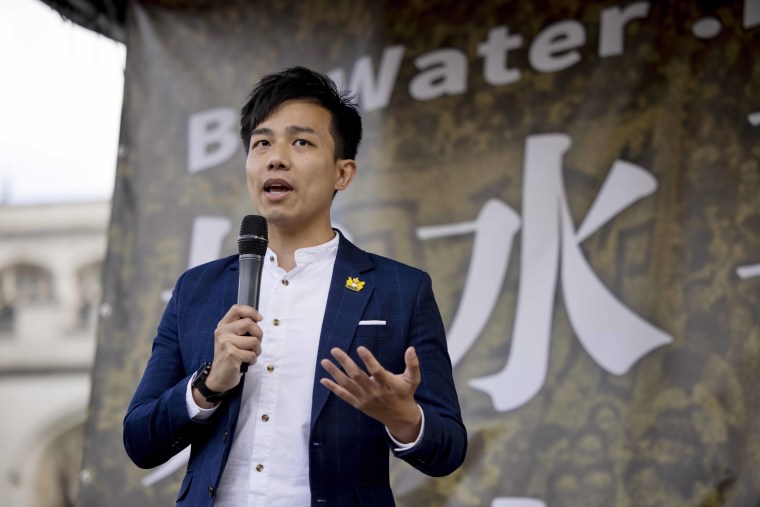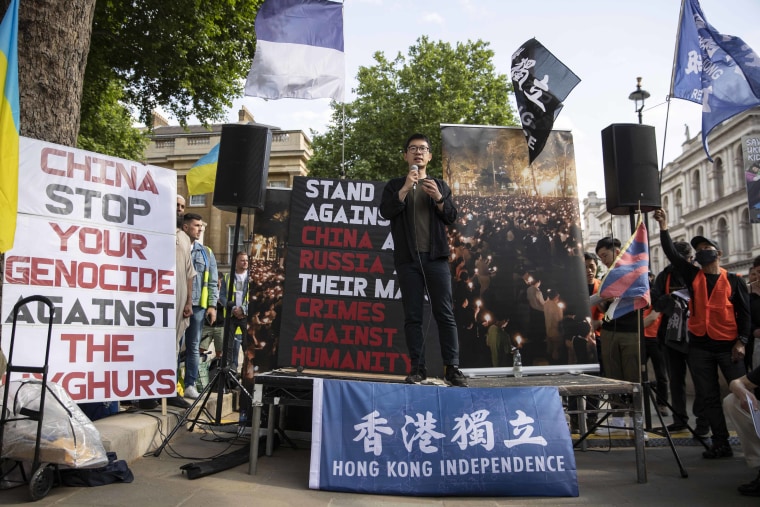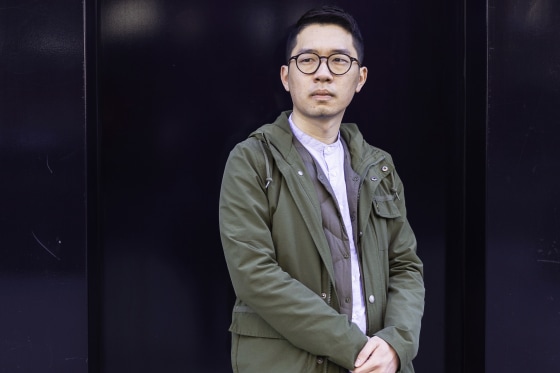LONDON — He woke up to find he had a million-dollar bounty on his head.
But Finn Lau, a pro-democracy activist from Hong Kong, said he wasn’t shocked to see the lucrative reward next to his mugshot on the arrest warrant issued earlier this week by national security police in the Chinese territory.
“This sort of bounty or safety risks will not deter me from continuing advocating for Hong Kong human rights and democracy,” he told NBC News by telephone Tuesday from his apartment in London.
Hong Kong authorities are offering 1 million Hong Kong dollars ($128,000) each for information leading to the arrest of Lau and seven other activists living in self-exile in the United States, Britain and Australia. They are the first such cash rewards since Beijing imposed a national security law on the city in June 2020, which the activists are accused of breaching.
The announcement comes as the international financial hub is trying to repair its image damaged by years of Covid restrictions, as well as the national security law, which the U.S. and others say is being used to erode freedoms that were promised to Hong Kong, a former British colony, upon its return to Chinese sovereignty in 1997.
Chinese and Hong Kong authorities say the law was necessary to restore stability after anti-government protests that roiled the city for months in 2019, sometimes turning violent.

The U.S., Britain and Australia, all of which suspended their extradition treaties with Hong Kong after the national security law was imposed, condemned the bounties, describing them as an attempt by China to intimidate and silence overseas critics.
The extraterritorial application of the national security law “is a dangerous precedent that threatens the human rights and fundamental freedoms of people all over the world,” the State Department said in a statement.
Chinese and Hong Kong authorities accuse the three countries of harboring “fugitives,” and say the U.S., Britain and Australia have also sought to apply their national security laws outside their own territories.
Their charges against the eight activists include urging foreign governments to impose sanctions on Hong Kong and advocating Hong Kong’s independence from China.
Since moving abroad, the activists have “continued to instigate the division of the country and subversion of state power, acting as pawns for external anti-China forces in their effort to interfere in Hong Kong affairs,” Chinese Foreign Ministry spokesperson Mao Ning said at a regular briefing in Beijing on Tuesday.
Chief Executive John Lee, Hong Kong’s top leader, has said the eight activists will be “pursued for life,” urging them to surrender. He encouraged “anyone,” including friends and relatives, to aid in their apprehension.
Speaking out from afar
Since leaving Hong Kong for the British capital in January 2020, Lau has continued to speak out about issues affecting his former home.
Chief among his concerns is the national security law, which criminalizes secession, subversion, terrorism and collusion with foreign forces. The law carries penalties up to life in prison and asserts jurisdiction over everyone in the world, regardless of nationality or location.
More than 250 people in Hong Kong have been arrested under the legislation, including 47 pro-democracy politicians and activists who have mostly been held without bail for more than two years.

On Wednesday, Hong Kong national security police said they had arrested four men between the ages of 26 and 28 who are accused of supporting overseas dissidents and advocating Hong Kong independence. The statement did not name the men or say whether the arrests were related to the warrants issued for the overseas activists.
A fifth man, 24, was arrested at Hong Kong International Airport on Thursday, the police said, adding that he was suspected of having ties with the group arrested the day before and that there could be further arrests.
Besides Lau, those targeted by the bounties include activists Nathan Law and Anna Kwok, former lawmakers Dennis Kwok and Ted Hui, lawyer and legal scholar Kevin Yam, union leader Mung Siu-tat and online commentator Yuan Gong-yi.
Lau said that he was no stranger to intimidation and harassment, but that he feared the bounty would “escalate personal risks, safety risks and risk of abduction.”
Those fears were shared by Law, who was 23 in 2016 when he became the youngest person elected to Hong Kong’s Legislative Council.
“There will be people who are incentivized to give out my information, my whereabouts,” said Law, who like Lau lives in London.
Law said he intended to travel only to countries that have suspended their extradition agreements with Hong Kong.
“I have to be more careful in my daily life and try to protect my personal safety,” he said.
Yam, an Australian citizen living in Melbourne, said Wednesday that he would “continue to live my life normally.”
As of Wednesday, the international police network Interpol said it had not received any “red notice,” or a global request for a person’s arrest pending extradition, for any of the eight overseas activists. Interpol’s constitution forbids it from “any intervention or activities of a political, military, religious or racial character,” it said in a statement, adding that it is also required to act in accordance with the Universal Declaration of Human Rights.
Hong Kong officials have also acknowledged that they’ll be unable to arrest the overseas activists unless they return to the city.
Yaqiu Wang, a senior researcher at Human Rights Watch, said that as the U.S. and other Western governments seek to improve their relations with China, they should place human rights at the center of their engagement. Not doing so, she said, has encouraged Beijing to be more “aggressive” in curbing dissent.
Law considers the bounties a badge of honor.
They prove, he said, “that what I’m doing is pressurizing the government and they are nervous about it.”

